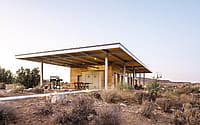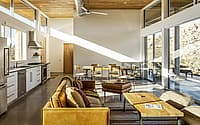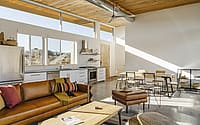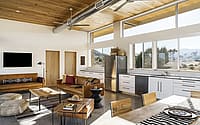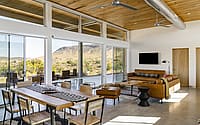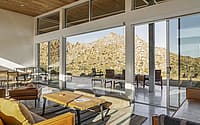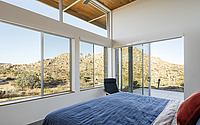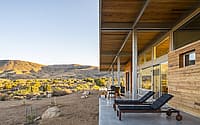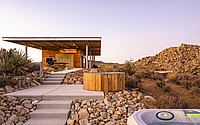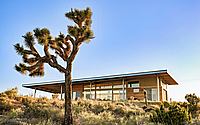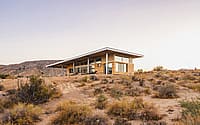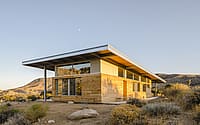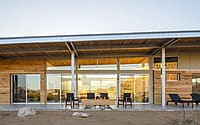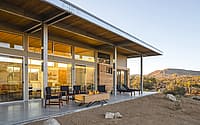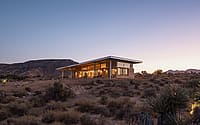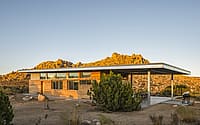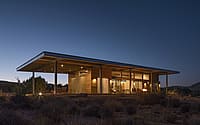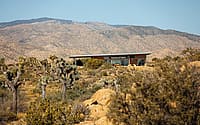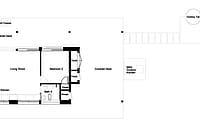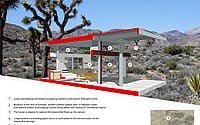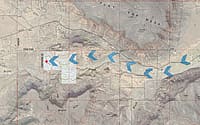Cowboy Modern Eco-Retreat by Jeremy Levine Design
Cowboy Modern Eco-Retreat is a beautiful sustainable home located in Joshua Tree, California, designed in 2019 by Jeremy Levine Design.

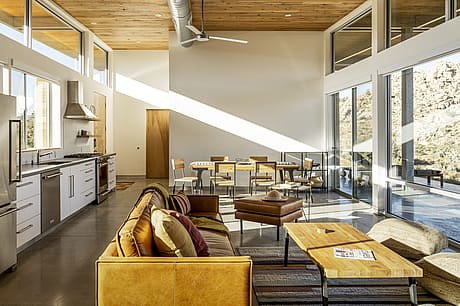
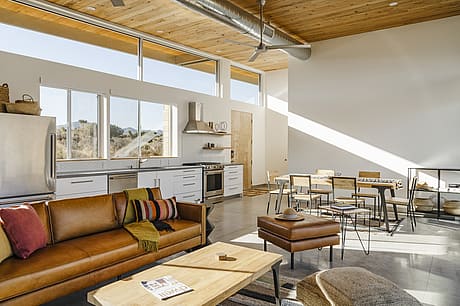
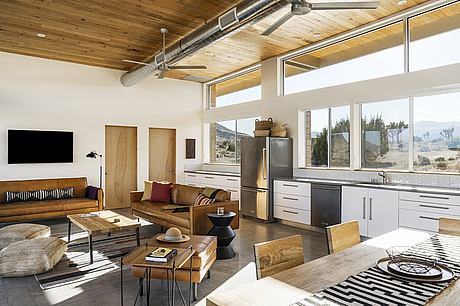
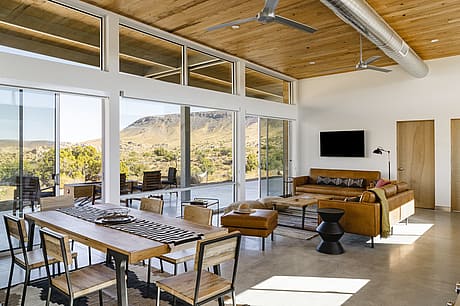
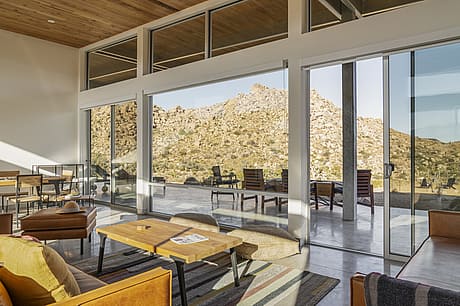
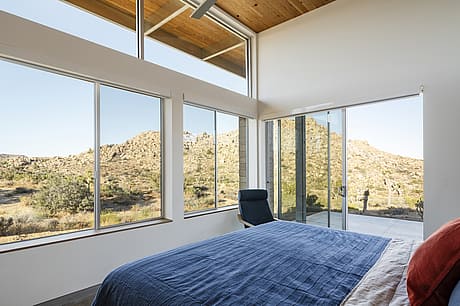
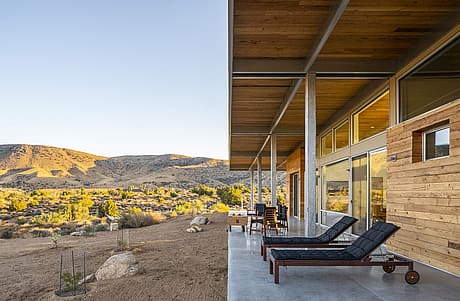
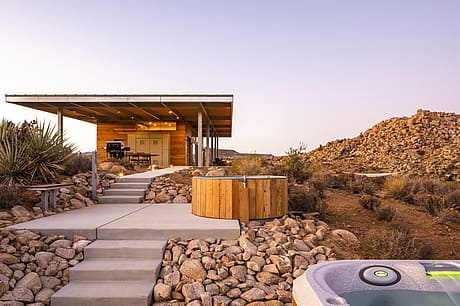
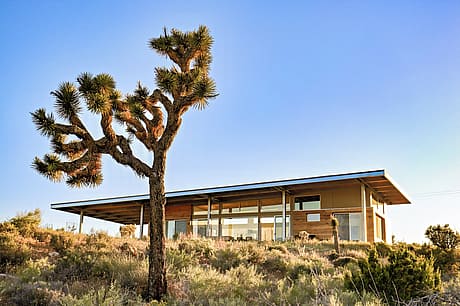
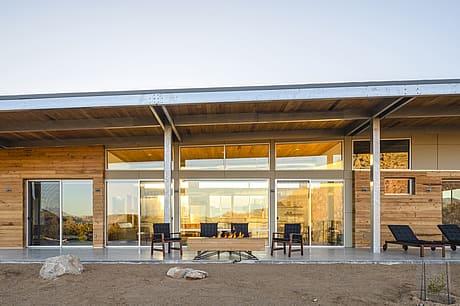
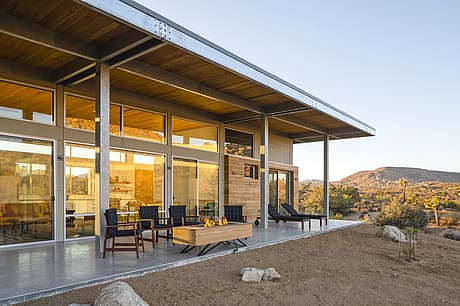
Description
Inspired by Pioneertown’s Old West architecture and the stark desert landscape, this new 1,200-square-foot, two-bedroom, two-bath home was designed as a family getaway dubbed Cowboy Modern Desert Eco-Retreat. Sustainable living and serene connection to nature directed the design choices—namely, siting the building for natural breezes and light through large glass windows and doors, orienting the house to minimize solar heat gain, building lightly on the land to ensure construction would not harm the fragile environment, and using locally reclaimed weathered lumber for all interior and exterior wood. To further minimize disturbance to the desert’s delicate ecosystem, the house’s structure is designed with a zero-waste system; metal columns and beams were manufactured off-site, then bolted together during construction, akin to a giant erector set.
Inside, the home features polished concrete floors, clean white walls, and exposed metal ducts. Large-paned windows frame desert views and admit daylight. The kitchen lines one wall of the open-concept great room, which is bookended by bedrooms and bathrooms. The main living space is kept free of walls and any other barriers to allow wind to passively ventilate the house. Furnishings play into the Old West-meets-Modern theme. Camel leather sofa and ottoman as well as rustic wood coffee and dining tables define the comfortable living/dining area. Outdoor furniture is made of wood with black upholstered cushions. The “jackrabbit” fire table by the house’s designer takes inspiration from local fauna and is made from leftover home-construction materials.
At an altitude of 4,800 feet, this part of the desert experiences extreme weather conditions. Therefore, the choices of materials and details were critical to the building’s performance. Steel for the frame, unlike wood, does not expand and contract significantly as the temperature changes. The moisture content of reclaimed lumber is minimal and its durability is superior to new lumber, which expands and contracts under extreme heat and cold. A clear sealant was applied to augment the wood’s weather resistance. The standing-seam metal roof features a reflective coating to withstand high winds.
The deep roof overhangs shade the house during the day and form a wrap-around porch on three sides. Basically equal to the square footage of the interior, the 1,000 square feet of outdoor space gives the family room for outdoor grilling, dining, and lounging. A stepped path leads to a hot spa and a cold cowboy tub, a nod to the Old West tradition of re-purposing galvanized livestock troughs as bathtubs.
Passive sustainability strategies are utilized to minimize the impact on the natural landscape. All gray water from the sinks, showers and washing machines is recycled for irrigation. Every room has large cooling fans as well as a large set of sliding glass doors to admit light and breezes. All lumber—exterior and interior—comes from Southern California demolition sites. The placement and orientation of the house capture the natural breezes that flow through the canyon and minimize solar heat gain. The property will approach net-zero status when planned solar panels are installed.
Photography by Lance Gerber, Jeremy Levine Design, Jared Fuller, and Tali Mackay
Visit Jeremy Levine Design
- by Matt Watts